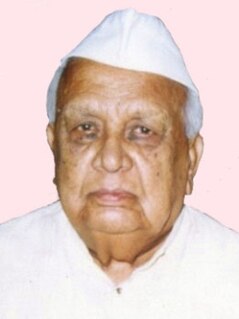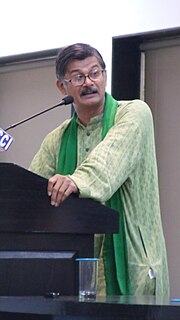Related Research Articles
Madhya Pradesh Kisan Mazdoor Adivasi Kranti Dal is a political party in Madhya Pradesh, India. MPKMAKD was formed as a breakaway from Communist Party of India (Marxist) in 2001. In the 2003 Madhya Pradesh legislative assembly elections, MPMKAKD was part of a third front, called 'Madhya Pradesh Jan Mukti Morcha'. The leader of MPMKAKD is Dr. Sunilal.
This article is about the first election held in Independent India in 1951-52.

Warren Martin Anderson was an American businessman who was the Chair and CEO of the Union Carbide Corporation (UCC) at the time of the Bhopal disaster in 1984. He was charged with manslaughter by Indian authorities.
Socialist Party has been the name of several political parties in India, all of which have their roots in the Congress Socialist Party during the freedom struggle.

The Praja Socialist Party, abbreviated as PSP, was an Indian political party. It was founded when the Socialist Party, led by Jayaprakash Narayan, Acharya Narendra Deva and Basawon Singh (Sinha), merged with the Kisan Mazdoor Praja Party led by J. B. Kripalani.
Arif Beg was a Bharatiya Janata Party (BJP) leader. He hailed from Indore in Madhya Pradesh state. His father, Qaramat ‘Pahalwan’ Baig, had reached Indore from Afghanistan.
Sunder Lal Patwa was an Indian politician, who served as the 11th Chief Minister of Madhya Pradesh and a cabinet minister in the Government of India. He was the only politician who defeated congress strong man Kamal Nath in 1997 from Chhindwara constituency for member of parliament. He was born in the village of Kukreshawar located between Manasa and Rampura in the Neemuch District of Madhya Pradesh.

Shivanand was an Indian politician and a freedom fighter from Satna district of Madhya Pradesh.He was President of Rewa Rajya Praja Mandal from December 1946 to January 1948 and was jailed five times during freedom struggle and expelled from Rewa state many times. He was elected from Satna Constituency to the Vindhya Pradesh Legislative assembly in 1952 and sworn in as Speaker of that assembly. He was also member of Madhya pradesh Legislative assembly from 1957-62 along with Vishweshwar Prasad.

Sirmour Vidhan Sabha constituency is one of the 230 Vidhan Sabha constituencies of Madhya Pradesh state in central India. This constituency came into existence in 1951, as one of the 48 Vidhan Sabha constituencies of the erstwhile Vindhya Pradesh state.

Tikamgarh Vidhan Sabha constituency is one of the 230 Vidhan Sabha constituencies of Madhya Pradesh state in central India. This constituency came into existence in 1951, as one of the 48 Vidhan Sabha constituencies of the erstwhile Vindhya Pradesh state.

Pandit Ram Kishore Shukla was an Indian politician and an activist for Indian independence.
National Alliance of People's Movements is an alliance of progressive people's organizations and movements in India. It is an umbrella organisation for a larger alliance integrating various civil society organisations and individuals working towards similar goals.

Sunilam, formerly known as Sunil Mishra, is an Indian socialist politician, writer, and former physicist. As of the mid-1990s, he served as the national general secretary of the Yuva Janata Dal.

Elections to the Bhopal Legislative Assembly were held on 27 March 1952.
Balkrishna Sharma was an Indian politician. He was a leader of the Communist Party of India and the Kisan Sabha. Sharma was active in organising peasants movement in northern Madhya Pradesh for various decades. Together with other CPI leaders such as Khan Shakir Ali Khan he organised occupations of estates of ex-princes and other large landowners. As of 1973 he was a member of the Central Kisan Committee, the national leadership of the All India Kisan Sabha.
Maheshdutta Chandragopal Mishra was an Indian politician. He was the son of Chandra Gopal Mishra, a prominent freedom fighter.
Shibban Lal Saxena was a former Indian politician and Freedom Fighter. He was son of late Shri Chhotey Lal Saksena and his uncles'were late Shri Shyam Sunder Lal Saksena and late Shri Ram Sunder Lal Saksena. He was born on 13 July 1906 to a wealthy Kayastha Family at Agra.
Gyan Singh is an Indian politician from the state of Madhya Pradesh. He was first elected to Lok Sabha in 1996 General Election.
Homi F. Daji was a member of the 3rd Lok Sabha of India. He represented the Indore constituency of Madhya Pradesh and was a member of the Communist Party of India.
The Kisan Mazdoor Mandal was a political party in Bhopal State, India. The party was formed in 1950 by proponents of a merger with Madhya Bharat, who split away from the Indian National Congress. The party had a Marxian orientation. KMM was supported by the 10,000-member trade union Mazdoor Sabha. Khan Shakir Ali Khan was the president of KMM. In the run-up to the 1952 Bhopal Legislative Assembly election, KMM was the main opposition to the Bhopal Congress.
References
- 1 2 3 4 5 6 7 8 9 10 Madhya Pradesh Who's Who, 1975–76: Eminent Individuals Listed Professionwise. New Era Publications. 1976. p. 171.
- 1 2 3 4 5 ummid.com. Exhibition in Bhopal on life & work of freedom fighter Khan Shakir Ali Khan
- 1 2 3 4 5 6 7 8 Shiri Ram Bakshi; S.R. Bakshi And O.P. Ralhan (2008). Madhya Pradesh Through the Ages. Sarup & Sons. pp. 423–424, 437 440. ISBN 978-81-7625-806-7.
- 1 2 3 4 5 6 Christophe Jaffrelot / Laurent Gayer (December 2013). MUSLIMS IN INDIAN CITIES. HarperCollins Publishers India. p. 162. ISBN 978-93-5029-555-7.
- 1 2 3 4 5 6 The New Indian Express. Bhopal gas tragedy and the forgotten crusader
- 1 2 Ashfaq Ali (1981). Bhopal, Past and Present : a Brief History of Bhopal from the Hoary Past Up to the Present Time. Jai Bharat Publishing House. p. 447.
- ↑ State Politics in India. 1968. p. !45.
- 1 2 3 Election Commission of India. STATISTICAL REPORT ON GENERAL ELECTION, 1951 TO THE LEGISLATIVE ASSEMBLY OF BHOPAL
- ↑ Madhya Pradesh Waqf Board. List of the Chair Persons and Administrators of M.P. Waqf Board
- ↑ Link, vol. 20, part 3. United India Periodicals. 1978. p. 158.
- ↑ International Review of History and Political Science, vol. 23. "Review" Publications. 1986. p. 11.